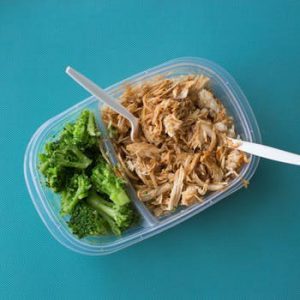Nutrition Articles
Spotlight on: Turkey
- Turkey is very low in fat and high in protein.
- It is also a good source of iron, zinc, phosphorus, potassium and B vitamins.
- The fat and calorie amounts vary although because white meat has fewer calories and less fat than dark meat and skin.

Recipe: Turkey Chili
2 cups chopped onion
4 garlic cloves, chopped fine
1 cup chopped green pepper
¼ cup olive oil
2 (35 oz.) cans stewed tomatoes, crushed
2 (15 oz.) cans kidney beans, drained
2 tablespoons tomato paste
¾ cup chicken or turkey stock
2 tablespoons chili powder
1 tablespoon ground cumin
1 tablespoon dried hot red pepper flakes
1 teaspoon dried oregano
1 tablespoon salt, plus more if desired to taste
½ teaspoon black pepper
3 to 4 cups shredded, cooked turkey meat
Sugar
In a large, 8-quart thick bottom pot, cook the onion and green pepper over medium heat, stirring until golden, about 5 minutes. Add the garlic, chili powder, cumin, and red pepper flakes, and cook, stirring, for a minute or two more. Add a bit more olive oil if needed. Add tomatoes, tomato paste, stock, beans, oregano, salt, pepper and cooked turkey meat. Bring mixture to a simmer and reduce heat to low. Simmer, uncovered for an hour.Salt to taste. Add 1 to 3 tablespoons of sugar to cut the acidity of the tomatoes, if desired. Serve alone, over rice or with corn bread.
Recipe: Creamed Turkey
3 tablespoons butter
¾ cup sliced mushrooms
3 tablespoons flour
1 ½ cups milk
½ cup hot chicken broth
1 small jar diced pimento, drained
4 cups diced cooked turkey
Salt and pepper, to taste
Melt butter over medium-low heat. Sauté mushrooms until golden and tender. Add flour; stir until smooth. Slowly pour on milk and broth, stirring constantly, until thickened and bubbly. Add pimiento, turkey, salt and pepper. Cook until heated through, but do not boil. Serve with rice or toast.
Your Child's Lunch- To Pack or not to Pack
It's a well-known fact that school-aged children who do not eat a nutritious breakfast or refuel with nutritious lunch during the middle of their school day lack focus, can be disruptive in class, and can oftentimes be very distracting to their fellow classmates.

Because kids are growing daily, they need the appropriate calories and nutritious value in their meals, especially breakfast and lunch, so that they can meet the demands of their growing bodies. If you need some help in decided what you should be packing in your child's lunch and what you should be keeping at the grocery store here is some help,
Lunchables or other pre-packaged lunch kits : Nutritionists call this “double packing” in that manufacturers have already packed the lunch and then you repack it into their lunch. Most of these pre-packaged lunches contain lots of sodium and fat, along with very few nutrients. These packaged meals leave kids feeling unfulfilled and therefore not refueled when it comes to tackling the rest of their day.
White bread : While sandwiches are a good choice for your child's lunch, if you are using white bread to make your sandwiches, then you are missing out on some significant nutritional value. Instead try some whole grain bread, with at least 3 grams of fiber per slice, so that your child gets more out of their sandwich than usual.
Fruit snacks : Fruit snacks are so very deceiving, they say they are made with real fruit, but they are made with fruit juice which is just sugar. Plus, fruit snacks get lodged into your kid's teeth very easily leading to decay. Choose an apple, orange or another healthy fruit for your child's lunch instead of those deceptive fruit snacks.
Soda : sure it's a no-brainer that you shouldn't be packing soda into your child's lunch, but still kids drink soda. Soda is high in sugar, high in calories, and high in caffeine and that's about it! Nutritionists are also weary of sports drinks, like Gatorade, because they are primarily sugar with some added salt. Milk or water is always best.
Pumpkin Spice Latte Breakdown
One sure sign of fall isn't the changing and falling leaves or the drop in temperature, it's definitely the Pumpkin Spice Lattes EVERYWHERE!
While they taste delicious, they can be one of the unhealthiest things you can drink all year. Here are some of the most popular brands that unfortunately aren't good for your overall health.

- Au Bon Pain Pumpkin Pie Latte : this latte packs 290 calories, 7 grams fat, 115 mg sodium, 49 grams carb, and 47 grams sugar. That's 12 tablespoons of sugar!
- Krispy Kreme Pumpkin Spice Latte : this seasonal favorite contains 310 calories, 11 grams fat, 120 mg sodium, and 43 grams carbs. The one saving grace of this drink is that these amounts are for the smaller size 12 oz cup.
- McDonald's McCafe Pumpkin Spice Latte : people are “lovin' it” but it's filled with 340 calories, 10 grams fat, 51 grams carbs, and 160 mg sodium. With 160 mg of sodium, that's twice the amount of salt than a kid's size French fries.
- Einstein Brothers Pumpkin Latte : this latte contains 370 calories, 10 grams fat, 65 mg sodium, 59 grams carbs, and 54 grams sugar. With 59 grams of carbs, that is twice the amount of a bagel, maybe it's time to rethink your beverage of choice!
- Starbucks Pumpkin Spice Latte : this is hands down the most popular fall drink of choice (come on, it had its own trending hash tag!) and it is filled with 440 calories, 8 grams fat, 280 mg sodium, and 63 grams carbs. You would be better off eating a pumpkin cream cheese muffin : which actually contains fewer calories!
- Dunkin Donuts Pumpkin Latte : this latte contains 470 calories, 13 grams fat, 250 mg sodium, and 71 grams sugar. And just because they offer three different flavors of pumpkin latte that doesn't mean you are in the clear if you order one over another : they are all made up of the same nutritional content. You would be better off eating three of their chocolate caramel donuts!
Spotlight on: Pumpkins
- Many people do not know that pumpkins are made up of 90 percent water.
- Pumpkins also contain other great nutritional aspects including potassium and vitamin A.
- The bright orange color of pumpkins also tells us that they are a great source of the important antioxidant, beta carotene.

Recipe: Traditional Pumpkin Pie
- 1 ¾ cups (one 15oz. can) unsweetened pumpkin puree
- ¾ cup light brown sugar, packed
- 2 teaspoons ground ginger
- 1 ½ teaspoons ground cinnamon
- ½ teaspoon salt
- 2/3 cup milk
- 2/3 cup heavy cream
- 3 large eggs
- 1 teaspoon vanilla extract
(For crust us a pre-made store bought crust or a homemade crust) In a small heavy saucepan, stir the pumpkin, brown sugar, spices and salt together until mixed. Bring the mixture to a simmer, stirring constantly. Reduce the heat to low and cook, stirring constantly, for 3 to 5 minutes or until thick and shiny. Scrape the mixture into a mixer or food processor for 1 minute. With the motor on, add the milk and cream, mixing until incorporated completely. Add the eggs one at a time, mixing just to incorporate, about 5 seconds after each egg. When you add the last egg, also add the vanilla. Pour the mixture into the prepared pie shell. Bake the pie for 50 - 60 minutes at 375 degrees.
Recipe: Pumpkin Soup
- 6 cups chicken stock
- 1 ½ teaspoons salt
- 4 cups pumpkin puree
- 1 teaspoon chopped fresh parsley
- 1 cup chopped onion
- ½ teaspoon chopped fresh thyme
- 1 clove garlic minced
- ½ cup heavy whipping cream
- 5 whole black peppercorns
Heat stock, salt, pumpkin, onion, thyme, garlic, and peppercorns. Bring to a boil; reduce heat to low, simmer for 30 minutes uncovered. Puree the soup in small batches (1 cup at a time) using a food processor or blender. Return to pan and bring to boil again. Reduce heat to low, and simmer for another 30 minutes, uncovered. Stir in heavy cream. Pour into soup bowls and garnish with fresh parsley.
Understanding Fats
Good fats? Bad fats? You will not find these terms on food labels. Instead you will see words like polyunsaturated and trans fats. This article will give you a brief explanation of the four types of fats (saturated, monounsaturated, polyunsaturated and trans fats) and how they affect your body.

Saturated Fats
Saturated fats are fats that stay solid at room temperature, such as lard, coconut oil and cow butter. Saturated fats are considered “bad fats” because they raise your bad cholesterol level, thereby raising your total cholesterol level. People whose diet consists of many foods high in saturated fats typically are at a higher risk of heart attack, stroke and cardiovascular disease.
Monounsaturated Fats
Monounsaturated fats have a lower melting temperature than saturated fats, which means that they do not stay solid at room temperature. These types of fats can be found in: peanut oil, olive oil, nuts and avocados.
Polyunsaturated Fats
Polyunsaturated fats are fats that can stay liquid even at lower temperatures, such as corn oil and sunflower oil. Polyunsaturated fats are also found in soybeans, fish, fish oil and in grain products.
Dieticians consider polyunsaturated fats the “good fats” as they lower cholesterol and they help prevent cardiovascular disease by lowering the amount of fat in the blood.
Trans Fats
Trans fats are man-made fats that are created during the hydrogenation process. These types of fats are unnatural and toxic to your body. Trans fats are abundant in packaged and processed foods.
Dieticians consider trans fats the “bad fats” as they can cause cancer, diabetes, obesity, birth defects, low birth weight babies, and sterility.

